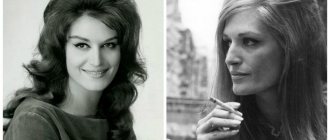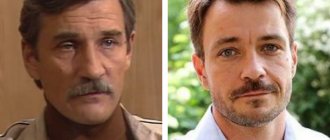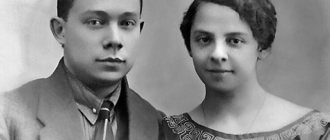Curriculum Vitae
Mikhail Mikhailovich Zoshchenko was born on July 28 (August 9), 1894 in St. Petersburg. His father was an artist, his mother wrote stories and acted in amateur theater. In 1907, the head of the family died, financially difficult times began for the family, which did not prevent the future writer from entering the gymnasium. After completing his studies there, Zoshchenko became a student at the Faculty of Law of the Imperial St. Petersburg University, from where he was expelled for non-payment.
In September 1914 he was enrolled in the Pavlovsk Military School. After completing accelerated wartime courses that lasted four months, Zoshchenko went to the front. He received several awards, including the Order of St. Anne, fourth degree, with the inscription “For bravery.” In 1917 he returned to peaceful life due to worsening illness. In a couple of years I managed to change several professions. Despite his exemption from military service, in 1919 he volunteered for active service in the Red Army. In April he was declared unfit and demobilized, but he joined the border guard as a telephone operator. After returning to Petrograd, Zoshchenko again began to constantly change professions. In addition, he began to attend the literary studio of Korney Chukovsky, which later turned into a club of modern writers.
On February 1, 1921, a new literary association appeared in Petrograd, called the Serapion Brothers. Among its members was Zoshchenko. Soon the writer made his debut in print. The stories, published in the 1920s, brought him enormous popularity. He began working with satirical publications, traveling around the country, speaking to the public reading short works. In the 1930s, Zoshchenko turned to a large form. Among other things, the story “Youth Returned” and the collection of everyday short stories and historical anecdotes “The Blue Book” were written at this time.
At the very beginning of the Great Patriotic War, Zoshchenko tried to go to the front, but he was declared unfit for military service. Then he joined the fire defense group. In September 1941, he was evacuated from Leningrad - first to Moscow, then to Alma-Ata. Zoshchenko lived there until 1943, after which he returned to the capital. During the war, he composed for the theater, wrote scripts, stories, feuilletons, and worked on the book “Before Sunrise.” Publication of the latter began in August 1943. Then only the first part was published in the magazine “October”. Then, from the Agitprop of the Central Committee, the editorial board of Oktyabr received an order to stop publication. They stopped publishing the story, and a large-scale anti-Zoshchenko campaign began.
The writer returned from Moscow to Leningrad, his affairs gradually began to improve, but in 1946 a new and even more terrible blow followed. It all started with the fact that the Zvezda magazine, without Zoshchenko’s knowledge, published his story “The Adventures of a Monkey.” On August 14, the organizing bureau of the Central Committee of the All-Union Communist Party of Bolsheviks issued a resolution “On the magazines Zvezda and Leningrad.” Zoshchenko was expelled from the Writers' Union and deprived of food cards. Hard times began, he and his family had to literally survive. From 1946 to 1953, Zoshchenko earned money through translations and also worked as a shoemaker, which he mastered in his youth. In June 1953 he was readmitted to the Writers' Union. The boycott ended for a short time. In the spring of 1954, Zoshchenko was invited to a meeting with English students. Answering a question from one of them regarding the 1946 resolution, Zoshchenko said that he could not agree with the insults addressed to him. This led to a new round of bullying.
The last years of the writer’s life were spent at a dacha in Sestroretsk. On July 22, 1958, Zoshchenko died. The cause of death was acute heart failure. The writer was buried in the cemetery in Sestroretsk.
Mikhail Zoshchenko and his “poison of zoological hostility towards the Soviet system”
He was born in St. Petersburg on August 9 (new style) 1895. His father, also Mikhail, came from a Little Russian noble family that lived in the Poltava region. Mother - Elena - was from the Great Russian nobility.
Just before the First World War, the future writer graduated from the St. Petersburg gymnasium and entered the law faculty of St. Petersburg University. The whole life of the writer will be connected with St. Petersburg-Petrograd-Leningrad. True, a year later he was expelled from the university, and in 1915, after short courses, he volunteered for the front with the rank of ensign. He was a machine gunner commander. He fought bravely. He was wounded and poisoned by military gases in battles with the Germans. Throughout the war he received five orders.
During the Civil War, he had to fight a little in the ranks of the Red Army. However, due to heart problems, he resigned.
After the Civil War, Zoshchenko became a professional writer and joined the famous literary group “Serapion Brothers,” which included Veniamin Kaverin and Konstantin Fedin .
With the end of war communism and the onset of the New Economic Policy, when private publishing houses and magazines were opened, Russian literature flourished. Particularly prominent in it is the satirical direction introduced by the inhabitants of the South of Russia - Kiev resident Mikhail Bulgakov and Odessa residents Kataev , Ilf and Petrov , who moved to Moscow during these years. It is interesting that, perhaps, the most talented Russian humorists and satirists, as a rule, are from the South of Russia, and Little Russian blood flows in their veins. Let us remember Gogol , Chekhov , who spoke of himself in letters to friends as a Ukrainian. Zoshchenko’s contemporary, the brilliant humorist and satirist Arkady Averchenko , as we see, also has a Little Russian surname. Both Odessa resident Mikhail Zhvanetsky and Kiev resident Oles Buzina, who was distinguished by his bright satirical talent (by the way, he studied at Odessa University for a year), were southerners.
The main satirist of the Land of Soviets in the 20s, of course, became Mikhail Zoshchenko. The main object of his devastating pen was the Soviet tradesman, “a boor born of the revolution” - semi-literate, narrow-minded, cunning, greedy, envious, cruel, but always comical. Zoshchenko is so popular both among the people and among the intelligentsia that the poet Osip Mandelstam even once wrote in admiration: I demand monuments to Zoshchenko throughout Russia.
(“We have a bible of labor, but we don’t value it. These are Zoshchenko’s stories. We trampled the only person who showed us a worker into the mud. And I demand monuments for Zoshchenko in all cities and towns of the Soviet Union, or at least as for grandfather Krylov, in the Summer Garden")
The writer's stories were so merciless and poisonous towards the Soviet petty bourgeoisie that they were recognized as anti-Soviet not only by vigilant citizens, but also by white emigration. Zoshchenko's books in the 20s were published in huge editions not only in Red Russia, but also in White émigré publishing houses.
The twenties and thirties were generally cloudless for the writer: he was popular and rich. He has an apartment in Leningrad, a dacha and a car. He is awarded government awards.
When the Great Patriotic War begins, the writer applies to volunteer for the front, but he is not accepted due to health reasons. In the fall of 1941, he left his native Leningrad and went into evacuation, first to Moscow and then to Alma-Ata.
Everything seems to be going well for Zoshchenko. Besides, the war is over, the terrible blockade of Leningrad has been lifted for 2 years, life is starting to get better. Thunder struck from the blue: on August 14, 1946, the Organizing Bureau of the Central Committee of the All-Union Communist Party of Bolsheviks adopted a resolution “On the magazines “Zvezda” and “Leningrad”.
This devastating document was preceded by the following events: in 1943, the magazine “October” was prohibited from publishing the “psychoanalytic” story “Before Sunset” by Zoshchenko (only the first chapters were published in it), but then the writer seemed to be carried away; in June 1946, Mikhail Zoshchenko even became a member of the editorial board of the Zvezda magazine, and in July the magazine published his story for children, “The Adventures of a Monkey.” It was previously published in the children's magazine "Murzilka". It was about a monkey that escaped from the zoo. It would seem, well, what kind of crime could there be, but there are no literary works in which the Bolsheviks could not see an enemy attack and ideological sabotage.
Ideological overseers charged the writer with the following: “In Zoshchenko’s portrayal, Soviet people are very primitive. The author is making our people stupid." And Stalin , who could not stand his work, spoke negatively about “The Adventures of a Monkey”: “This is the most empty thing, giving nothing to the mind or heart.”
Before the release of the resolution, the MGB Organizing Bureau prepared a special certificate for the highest party bodies about Zoshchenko, whose biography was presented in the most negative tones. The writer was accused of complaining about the lack of freedom of creativity in the USSR, and also “expressed a hostile attitude towards Soviet censorship, complained about the inability to engage in creative work.” The security officers did not like his pacifist mood either.
In the very text of the party resolution, Zoshchenko was called a vulgar and a scumbag, and his story, which he published during the war, “Before Sunrise,” was defined as a “disgusting thing.”
“Zoshchenko portrays Soviet orders and Soviet people in an ugly caricature, slanderously presenting Soviet people as primitive, uncultured, stupid, with philistine tastes and morals. Zoshchenko’s maliciously hooligan portrayal of our reality is accompanied by anti-Soviet attacks,” said the Resolution of the Organizing Bureau of the Central Committee of the All-Union Communist Party of Bolsheviks.
In addition to the resolution, Zoshchenko was also subjected to offensive criticism by the leader of the Leningrad communists, Andrei Zhdanov . In his speech to party activists and Leningrad writers, which was published in Pravda, he said that the story “The Adventures of a Monkey” was poisoned by “the poison of zoological hostility to the Soviet system,” and in the story “Before Sunrise,” Zoshchenko brought out “people and themselves as vile lustful beasts.” The report also took a toll on the poet Anna Akhmatova , whom Zhdanov called an enraged lady who rushes between the chapel and the boudoir.
After this, Zoshchenko, according to the old Soviet tradition, stopped publishing and, together with Akhmatova, was expelled from the Union of Writers of the USSR. And it’s the Bolsheviks who treat him humanely. In the second half of the 30s, he would either have been shot, like his colleagues Babel, Kornilov and Pilnyak , or sent to camps, like Mandelstam, where he died.
Under the late Stalin, Zoshchenko was able to engage only in translations from Finnish and shoemaking, which he mastered in his youth. Among other things, he became a translator of the story “Behind the Matches” by the Finn Maju Lassila , which we will recall again below.
Zoshchenko would have been silent for a little bit, and after Stalin’s death his disgrace might have been lifted, and they would have started publishing again. But pride and honor did not allow Mikhail Mikhailovich to remain silent.
At a meeting in 1954 with English students, who at first sincerely believed that Zoshchenko and Akhmatova had died, the British asked the writer and poet a question: did they agree with the resolution of the Organizing Bureau of the Central Committee of the All-Union Communist Party of Bolsheviks? If Akhmatova said that yes, she agreed, then Zoshchenko, as a military officer, categorically refused to consider himself a vulgar and scumbag. And this, alas, was the beginning of the end for him, a blow from which he never recovered. He is again subjected to processing, but he categorically refuses to repent.
Only in 1988, during Perestroika under Gorbachev , this shameful resolution was canceled as erroneous.
After working in 1954, Zoshchenko lived for another four years; he wrote almost nothing due to constant depression and died in 1958 at his dacha in Sestroretsk.
Under Brezhnev, Zoshchenko was returned to Soviet literature. His works are beginning to be published again. Leonid Gaidai in 1975 shoots the film “It Can’t Be!” based on three works of the writer, and 5 years later he makes the film “Behind the Matches” based on the Finnish story of the same name, which Zoshchenko once translated. Actor Alexander Filippenko appears on Soviet television programs reading the writer's stories.
Already under Gorbachev, Zoshchenko’s three-volume work was published, and the disgrace from it was completely removed. The perestroika press begins to write about his persecution under Stalin. It becomes a symbol of how the communist authorities treated writers.
Unlike many Soviet writers, whose names were popular during the USSR and are now forgotten, Zoshchenko is still popular. I think that Russian readers will never lose interest in his work.
Brief analysis of creativity
Zoshchenko's greatest fame came from his satirical works - mainly short stories. The writer had a wealth of life experience - he had been to war and managed to change many professions. In the trenches, on public transport, in the kitchens of communal apartments, in pubs, Zoshchenko overheard living everyday speech, which became the speech of his literature. As for the hero of the writer’s works, he said the following about him: “Each of us has certain traits of a tradesman, an owner, and a money-grubber. I combine these characteristic, often shaded features in one hero, and then this hero becomes familiar to us and seen somewhere...” As literary critic Yuri Tomashevsky noted, in Zoshchenko’s work it is not the person himself who is ridiculed, but the “sad traits” of human character.
In the second half of the 1930s and early 1940s, Zoshchenko turned to children's literature. This is how the cycles “Lelya and Minka” and “Stories about Lenin” appeared. They included short texts based on the genre of moralizing stories.
The most important role in Zoshchenko’s literary heritage is played by the autobiographical and scientific story “Before Sunrise,” which the writer himself considered the main work of his life. He began collecting material for it back in the mid-1930s. In a letter to Stalin, Zoshchenko noted that the book was “written in defense of reason and its rights”, that it “contains a scientific theme about Pavlov’s conditioned reflexes” and, “apparently”, has been proven “its useful applicability to human life”, that This "revealed Freud's gross idealistic errors." During the writer's lifetime, the story was never published in full. This first happened only in 1973, and in the USA. In Russia, “Before Sunrise” was published in its entirety only in 1987.
- “Aristocrat”, analysis of Zoshchenko’s story
- “Case History”, analysis of Zoshchenko’s story
- “Trouble”, analysis of Zoshchenko’s story
- “Monkey Language”, analysis of Zoshchenko’s story
- “Meeting”, analysis of Zoshchenko’s story
- “Galoshes”, analysis of Zoshchenko’s story
- “Nervous people”, analysis of Zoshchenko’s story
- “Yolka”, analysis of Zoshchenko’s story
- “Glass”, analysis of Zoshchenko’s story
- “Great Travelers”, analysis of Zoshchenko’s story
- “The most important thing”, analysis of Zoshchenko’s story
- “Fitter”, analysis of Zoshchenko’s story
- “Carousel”, analysis of Zoshchenko’s story
- “The Sorcerer”, analysis of Zoshchenko’s story
According to the writer: Mikhail Mikhailovich Zoshchenko
Literary activity
However, not all of the writer’s works were warmly received by readers. Zoshchenko’s humorous creations were popular, but they expected him to continue in the same genre. In 1929, Mikhail published a book entitled “Letters to a Writer.” The latter was a kind of sociological study, which consisted of letters from fans.
After reading the book, readers were perplexed. In addition, after its release there was a negative reaction from government officials. The latter even forced the famous director Meyerhold to remove the production of “Dear Comrade” from the theater’s repertoire.
From a young age, Mikhail Mikhailovich Zoshchenko was distinguished by excessive susceptibility and a tendency to depression. In the thirties, the authorities sent writers on a trip along the White Sea Canal in the hope that they would reflect in their works the miracles of re-educating criminals into “useful” people.
However, what he saw shocked Zoshchenko, causing a feeling of oppression. After a while, he shared his impressions in a story called “The Story of One Life.” This was not at all what one was looking forward to from a prose writer.
Miguel de Cervantes Saavedra (1547-1616) - brief biography, life and work of the writer
In an attempt to get rid of depression, Mikhail created a work called “Youth Restored.” It is noteworthy that the story aroused great interest among representatives of the scientific community. Inspired by this reaction, the master continued to explore the intricacies of human relationships, releasing the collection “The Blue Book” in 1935. But not everyone was enthusiastic about the writer’s work; he was stigmatized in the party press. Mikhail was forbidden to publish works that went beyond the scope of “good satire.”
The writer, constrained by censorship, began to actively write works for children, which were published in various publications. Some of them:
Later they were included in a publication called “Lelya and Minka”. Five years later, the second book, “The Most Important Thing,” was published.











